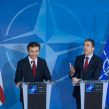
Georgian Government Tries to Appease Its Critics, While Failing to Change the Substance of Its Foreign Policy
Publication: Eurasia Daily Monitor Volume: 10 Issue: 87
By:

On April 30, Georgian Prime Minister Bidzina Ivanishvili assertively declared that Georgia should make firm steps in order to obtain a North Atlantic Treaty Organization (NATO) Membership Action Plan (MAP) already next year (www.civil.ge, May 1). Historically, MAP has represented the last step for a country before its actual NATO membership.
The prime minister’s statement was quite a surprise for a number of reasons. First, Ivanishvili, a pragmatic and shrewd businessman, should and most probably does know quite well that obtaining MAP for Georgia is absolutely unrealistic in the next year. The country had far better chances of receiving MAP back in April 2008 at the NATO Bucharest Summit, before the August 2008 Russian-Georgian war, which saw Georgia’s territories of Abkhazia and Tskhinvali Region (South Ossetia) fully occupied and recognized as “independent states” by Russia. However, NATO refused to grant MAP to Georgia at that summit (www.president.gov.ge, April 3, 2008). Now, when 20 percent of the country’s territory is under firm Russian military occupation, it is even more unrealistic to expect that NATO will grant MAP to Georgia. The Alliance would be unwilling to risk aggravating relations with Russia without having any meaningful leverage over Moscow to force it into withdrawing from the occupied territories. Second, Ivanishvili’s statement, in fact, is the first case when the prime minister—who undertook an active course of rapprochement with Russia—clearly and boldly declared that Georgia needs MAP in order to join NATO. Third, the head of government’s assertive tone contradicts his own position that Georgia should refrain from making any statements that irritate Moscow. Needless to say, Georgia’s NATO membership is one of the most explosive issues that enrage the Kremlin.
Ivanishvili’s statement raises a number of questions: What purpose did his statement serve? What does this statement mean? Is the new Georgian government signaling its intention to pursue a pro-Western foreign policy course? Is the prime minister playing Georgia’s NATO membership card to gain some concessions from an uncompromising Moscow? Or is Prime Minister Ivanishvili merely appeasing the critics of his increasingly pro-Russian foreign policy orientation, while intending to continue his pro-Moscow course?
The developments that immediately followed Ivanishvili’s statement may provide an answer to these questions. On May 2, the Olympic Committee of Georgia unanimously voted that the country’s national team would participate in the 2014 Winter Olympics in Sochi, Russia (www.radiotavisupleba.ge, May 2), which the previous government was planning to boycott in protest of Russia’s occupation of Abkhazia and the Tskhinvali Region. Needless to say, the Georgian Olympic Committee acted with the Georgian government’s support. Prime Minister Ivanishvili himself, on multiple occasions, supported Georgia’s participation in the Sochi Olympics (www.gurianews.ge, October 16, 2012; www.geworld.ge, December 24, 2012). Georgia’s participation is widely opposed by Georgians as a self-humiliating act for the country, while it remains partially under Russian occupation. Nevertheless, the committee and the government still decided to go ahead with the decision.
Also on May 2, the Georgian parliament launched an active phase of debates on the partial decriminalization of the Law on Occupied Territories (www.civil.ge, May 2, 3), which had been adopted by Georgia soon after August 2008 Russian-Georgian war. The legislation, among other restrictions on movement and conduct of business in the occupied Georgian territories, makes it a punishable criminal offense for foreign citizens to cross Georgia’s borders into the occupied territories without the consent of the Georgian government (https://www.smr.gov.ge/docs/doc215.pdf). Moscow has fiercely opposed the law since its adoption and repeatedly demanded that Tbilisi annul or at least soften it. The Georgian Dream (GD)-dominated parliament is now attempting to make it an administrative, but not a criminal offense to cross the border without the central government’s approval. The move is but the latest compromise in the long list of concessions that the Georgian government has made to satisfy Moscow’s ever increasing demands (see EDM, December 4, 2012; April 4, 2013).
Additionally, several days before Prime Minister Ivanishvili’s statement, the government announced that it would not hold the traditional military parade on Georgian Independence Day on May 26 (www.newposts.ge, April 26; www.kvirispalitra.ge, April 29). Displays of Georgia’s military capabilities always annoyed Russia, since such military parades were seen as a symbol of Georgia’s new statehood.
All of the aforementioned developments clearly show that the Georgian government does not plan to give up on its pro-Russian foreign policy course. Ivanishvili’s statement regarding Georgia securing MAP by next year appears to have been meant foremost to appease the opponents of his pro-Moscow foreign policy course. While the Georgian prime minister can be expected to continue his pro-Western rhetoric, the substance of his policies will not change. The government will remain on a course of rapid rapprochement with Russia. Nevertheless, Tbilisi will find it increasingly difficult to maintain its pro-Western rhetoric while it continues to agree to further political and economic concessions to Moscow—especially when the latter’s aim is to gradually bring all of Georgia under Russia’s sphere of influence.




